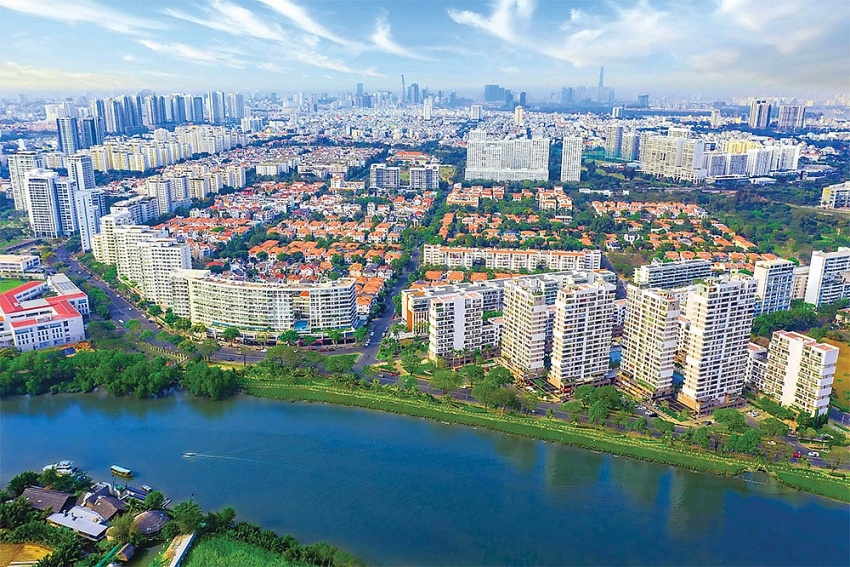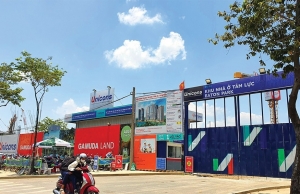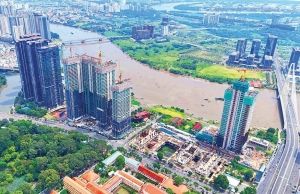Short-term real estate issues remain
According to Hoang Huy, director of the Institutional Customer Research Department at Maybank Securities, the current cash flow in the real estate market is showing signs of improvement, albeit slowly, after being disrupted in the past few years.
“Cash flow from business activities has begun to return, and low interest rates also make buyers more confident in disbursement as the government allows projects to resume, and some businesses issue shares and sell assets to reduce debt leverage,” Huy said.
In addition to attracting more credit capital from the end of last year, more positivity from the bond market has helped support the liquidity of businesses, as Decree No.08/2023/ND-CP from March allows debt rescheduling for another two years, as well as debt restructuring support activities from the State Bank of Vietnam (SBV).
“In general, cash flow has returned, albeit slowly, but the worst point of the market is over,” Huy said.
 |
According to Decree 08, if the bond-issuing corporation cannot pay fully and on time bond interests and principals in VND according to the bond issuance plan, the corporation may negotiate with bondholders to pay them upon their maturity.
Meanwhile, credit flow into real estate sector looking positive, according to Nguyen Duc Lenh, deputy director of the SBV’s Ho Chi Minh City branch.
Speaking at the 2024 Finance Real Estate Forum last week in the city, Lenh said that real estate credit growth had shown signs of growing again from January, with the highest increase in April.
“Total outstanding real estate debt in Ho Chi Minh City at the end of April increased by 1.6 per cent compared to the end of last year, of which the majority came from end users buying houses for living, accounting for 68 per cent,” he said. “Bank credit plays an important role in the real estate sector and is currently having positive effects. Accordingly, lower lending interest rates, new policies, and the implementation of new laws have helped overcome existing problems.”
Le Hoang Chau, chairman of Ho Chi Minh City Real Estate Association, said that there were clear signals showing that the real estate market had overcome its most difficult period ever. “The market will begin to recover from the end of 2024, slowly but more stably,” Chau said. “Although there are clear signs of recovery, the market still faces many difficulties, at least in the short term when new regulations will need time before being fully implemented.”
Chau said that capital flow was the most difficult problem for developers, with liquidity second. “Only when buyers decide to buy, can the market recover fundamentally and sustainably,” he said.
He also raised the issue from the borrower’s perspective, when interest rates on new loans are low, but old loans are still high. “Although about 70 per cent of real estate business problems are legal issues, we need more ‘non-credit’ solutions to solve related credit activities,” he added.
Meanwhile, Lenh of the SBV said that when a project has fully completed its legal documents, banks can fully respond and find ways to provide new loans. “As for unlocking the flow of credit capital, the market has currently seen positive changes, but liquidity requires flexibility from developers,” he noted.
Lenh cited credit growth in industrial zones in the first four months of the year were at 9.5 per cent compared to the end of last year, accounting for around $1.85 billion.
“This proves that the self-regulating market is very flexible and smart, and good businesses will be met and supported by credit. Credit institutions are ready to meet business’ capital requirements, as long as the project is eligible,” he said.
Huy from Maybank Securities said solutions to unlock capital flows currently focused mainly on situational solutions, from bond extension negotiations and bank credit. Another solution being promoted is to increase the mobilisation of additional capital to increase equity.
“Listed real estate businesses are planning to issue a record amount of capital. However, not all issuers can be successful,” Huy said.
“Foreign investors expect clearer and more favourable legal mechanisms and corridors, as well as the acceleration of public projects and industry linkages, thereby helping to reduce logistics costs and improve efficiency and competitiveness.”
| Truong Khac Nguyen Minh, deputy general director KCN Vietnam
Regarding capital flows, I have seen a positive point in the industrial property segment, which is still growing well, as foreign investment flows into Vietnam in recent years are stably increasing, especially the mammoth international investors and large-scale projects. The government is also currently trying to open up capital flows under many different policies. The industrial property market has certain opportunities and advantages in terms of investment capital, so the problem of industrial zone developers is how to maintain this advantage and utilise this opportunity to attract solid investment capital. It is necessary to continue to improve the investment environment, industry and regional linkages as well as the legal corridor. At the same time, there needs to be a mechanism to encourage and support industrial real estate investors to be able to reduce their investment and construction costs and remove difficulties related to procedures and processes, thereby helping to promote and speed up the implementation of new industrial projects with reasonable and more competitive rental prices. Industrial real estate investors and developers have to continuously upgrade and improve their products and consulting services, accurately grasping the needs of customers and investors. KCN Vietnam pays special attention to small- and medium-sized enterprises. This is an important customer group for developers with great potential. This customer group usually not to require large warehouse areas but a full range of accompanying operating support services. Industrial real estate developers are required to be flexible in product solutions and support services for this group of customers. Truong An Duong, general manager North Vietnam and Residential Frasers Property Vietnam
The real estate market in 2023-2024 is in the “fire to test gold” phase. Projects that are fully legal, meet the real need of customers, have good developers, and gain customer trust will still maintain their attraction to customers and investors. The reason industrial real estate has maintained its growth momentum is due to internal factors of the economy combined with investment opportunities from the China+1 policy. Outstanding internal factors that can be mentioned are the country’s leadership strengthening diplomatic relations with major powers, attracting more overseas funding as well as diversifying high-value supply chains from multinational corporations. Meanwhile, public investment policies focus on developing synchronous infrastructure from north to south, reducing logistics costs for businesses and increasing regional connectivity and linkage. The government has also issued preferential tax policies and loan interest exemption for manufacturing enterprises. Some key industrial provinces themselves are also expanding their industrial and logistics land portfolios, while focusing on training highly skilled human resources to be ready to meet the growing demand of investors. Sustainable development is no longer simply a trend but an inevitable standard of future development. It is not only helping to save operating costs for businesses, but also provides an effective working environment for employees. |
 | Housing attractive for foreign developers The flow of foreign capital invested in real estate in the first four months of the year has been impressive, but the domestic market has not yet fully recovered. |
 | Sunnier days anticipated through updated land laws The proposal to implement the revised Land Law from July instead of next year is expected to bring confidence to the real estate sector. |
 | Vietnamese real estate platform WeSale secures seed funding from Singapore's Hitseries Capital WeSale, a real estate trading platform in Vietnam, has secured undisclosed seed round investment capital from Hitseries Capital, a venture capital fund headquartered in Singapore, it announced on May 27. |
What the stars mean:
★ Poor ★ ★ Promising ★★★ Good ★★★★ Very good ★★★★★ Exceptional
Related Contents
Latest News
More News
- Saigon Centre gains LEED platinum and gold certifications (February 12, 2026 | 16:37)
- Construction firms poised for growth on public investment and capital market support (February 11, 2026 | 11:38)
- Mitsubishi acquires Thuan An 1 residential development from PDR (February 09, 2026 | 08:00)
- Frasers Property and GELEX Infrastructure propose new joint venture (February 07, 2026 | 15:00)
- Sun Group led consortium selected as investor for new urban area (February 06, 2026 | 15:20)
- Vietnam breaks into Top 10 countries and regions for LEED outside the US (February 05, 2026 | 17:56)
- Fairmont opens first Vietnam property in Hanoi (February 04, 2026 | 16:09)
- Real estate investment trusts pivotal for long-term success (February 02, 2026 | 11:09)
- Dong Nai experiences shifting expectations and new industrial cycle (January 28, 2026 | 09:00)
- An Phat 5 Industrial Park targets ESG-driven investors in Hai Phong (January 26, 2026 | 08:30)



 Tag:
Tag:



















 Mobile Version
Mobile Version